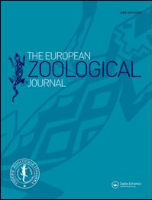
European Zoological Journal
Scope & Guideline
Advancing the Frontiers of Animal Science
Introduction
Aims and Scopes
- Taxonomy and Systematics:
The journal emphasizes the taxonomy and systematics of various animal groups, providing descriptions of new species, revisions of existing classifications, and phylogenetic studies that enhance our understanding of biodiversity. - Ecology and Behavior:
Research published often explores ecological interactions and behavioral patterns among species, offering insights into habitat use, feeding strategies, and reproductive behaviors in diverse environments. - Conservation Biology:
The journal is committed to conservation issues, frequently publishing studies that assess the impact of environmental changes, pollution, and human activities on wildlife populations and their habitats. - Physiological and Molecular Studies:
There is a notable focus on physiological adaptations and molecular biology, including studies on the effects of pollutants, climate change, and genetic diversity on various species. - Environmental Impact Assessments:
Papers often address the ecological consequences of anthropogenic factors, including the introduction of invasive species, habitat modification, and climate change, contributing to effective management and conservation strategies.
Trending and Emerging
- Molecular Ecology and Genetics:
There is a growing emphasis on molecular techniques to study genetic diversity, population structure, and evolutionary relationships, reflecting advancements in genomic technologies and their application in conservation biology. - Impacts of Climate Change:
Research focusing on the effects of climate change on animal populations, behavior, and distribution has gained prominence, highlighting the urgent need to understand and mitigate these impacts on biodiversity. - Ecotoxicology and Environmental Stressors:
Studies investigating the effects of pollutants and environmental stressors on wildlife physiology and health are increasingly common, emphasizing the need for bioindicators in ecological assessments. - Conservation Genomics:
Emerging themes include the application of genomics in conservation efforts, such as identifying genetic resilience in populations and informing breeding programs for endangered species. - Urban Ecology:
Research exploring the adaptability and ecology of species in urban environments is on the rise, reflecting the growing importance of understanding wildlife interactions in human-dominated landscapes.
Declining or Waning
- Traditional Morphological Studies:
There has been a noticeable decrease in studies focusing solely on traditional morphological descriptions without accompanying molecular data. This trend indicates a shift towards integrative approaches that combine morphological and genetic analyses. - Invasive Species Management:
Although still relevant, the frequency of papers specifically addressing management strategies for invasive species has waned, possibly as researchers focus on broader ecological impacts and conservation genetics. - Behavioral Ecology of Common Species:
Research on the behavioral ecology of more ubiquitous or common species appears less frequently, suggesting a shift towards studies on endangered or less-studied taxa that may provide more impactful conservation insights.
Similar Journals

PAKISTAN JOURNAL OF ZOOLOGY
Empowering research to protect our biodiversity.Pakistan Journal of Zoology, established in 1975 and published by the Zoological Society of Pakistan, is a pivotal resource in the field of zoology and animal science, contributing to the academic discourse and research advancements in the region. With an ISSN of 0030-9923, this journal strives to disseminate innovative research findings and scholarly articles that explore various facets of animal biology, ecology, and conservation. Although classified in the Q4 quartile within the animal science category, its commitment to providing a platform for emerging researchers makes it crucial for those in the zoological community. The journal covers a broad range of topics relevant to contemporary issues in zoology, promoting both local and international collaborations. Situated in Lahore, Pakistan, its contributions are vital for promoting biodiversity awareness and conservation efforts within the region. Accessible research outputs empower students and professionals alike to engage in critical discussions and applications within the disciplines of zoology and animal science.

CYBIUM
Diving deep into the science of fish and their habitats.CYBIUM is a reputable journal published by the Société Française d'Ichtyologie, dedicated to advancing research within the fields of Animal Science and Zoology as well as Ecology, Evolution, Behavior and Systematics. With a commitment to fostering scientific dialogue, CYBIUM has been a valuable resource for scholars since its inception in 1996, reporting on a wide array of ichthyological studies and aquatic biology. The journal is recognized in the 2023 Scopus rankings with a notable position in the Q3 quartile for Animal Science and Zoology and Q4 for Ecology, Evolution, Behavior and Systematics, reflecting its growing influence in these disciplines. Although currently not categorized as Open Access, CYBIUM continues to provide essential insights into fish biology and ecology from the heart of France, the Museum national d'Histoire naturelle in Paris. Researchers, professionals, and students in related fields will find CYBIUM an indispensable tool for staying informed about the latest developments and research trends within ichthyology and marine sciences.

BELGIAN JOURNAL OF ZOOLOGY
Pioneering Discoveries in the World of Animal Science.The BELGIAN JOURNAL OF ZOOLOGY, published by the Royal Belgian Zoological Society, serves as a prominent platform for advancing research in the field of zoology. With an impact factor reflecting its status within the academic community, this journal rigorously publishes innovative studies and reviews, covering a broad spectrum of topics related to animal science and zoology. As an esteemed outlet, the journal ranks in the Q2 category for both Animal Science and Zoology, demonstrating its relevance and contribution to the field, as indicated by its Scopus ranking of 255 out of 490. Although it operates under a subscription model, the journal is committed to disseminating high-quality research that can shape contemporary understanding of animal biology and ecology. With a publication history dating back to 1990 and extending through 2024, researchers, professionals, and students are encouraged to engage with its rich content, which is vital for ongoing discourse and discovery within zoological sciences.

Neotropical Biology and Conservation
Preserving Biodiversity, One Study at a TimeNeotropical Biology and Conservation, published by Pensoft Publishers, serves as a pivotal platform for researchers and professionals dedicated to the understanding and preservation of biodiversity in the Neotropical region. This Open Access journal, operational since 2006 and based in Brazil, invites contributions that delve into the complexities of ecology, evolution, and conservation strategies pertinent to the diverse ecosystems of South and Central America. With a commendable 2023 impact factor reflected in its Q3 rankings across multiple categories including Animal Science, Ecology, and Plant Science, it stands as a valuable resource for academics seeking to publish innovative findings and foster dialogue in these critical areas of study. The journal's commitment to open access ensures that knowledge is readily available to anyone interested in advancing the field of neotropical biology and conservation. Join the global conversation and contribute to the vital work of preserving our planet’s rich biological heritage through rigorous research published in this esteemed journal.

ACTA SOCIETATIS BOTANICORUM POLONIAE
Pioneering Discoveries in Plant Science and EcologyACTA SOCIETATIS BOTANICORUM POLONIAE is a reputable open-access journal dedicated to the field of Plant Science, published by the Polskie Towarzystwo Botaniczne since 1923. With an ISSN of 0001-6977 and an E-ISSN of 2083-9480, this journal has made significant contributions to the botanical sciences, fostering the dissemination of research from Poland and beyond. The journal has ranked in the third quartile (Q3) within its category in the 2023 journal metrics, demonstrating a strong presence in the global academic community, as evidenced by its Scopus ranking of 291/516 within the Agricultural and Biological Sciences sector, placing it in the 43rd percentile. While specific H-Index data are currently not available, ACTA continues to attract submissions from a broad international audience and publishes a wide range of studies that advance the understanding of plant biology, ecology, and conservation. The journal remains a vital resource for researchers, professionals, and students alike, committed to enhancing knowledge and collaboration in botanical science.
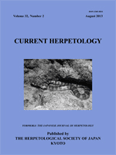
CURRENT HERPETOLOGY
Exploring the intricate world of reptiles and amphibians.CURRENT HERPETOLOGY is a leading journal dedicated to the study of reptiles and amphibians, published by the Herpetological Society of Japan in collaboration with the Graduate School of Science at Kyoto University. With its ISSN 1345-5834 and E-ISSN 1881-1019, this journal serves as a vital platform for sharing significant research findings in the field of herpetology. The journal has been continuously contributing to the scientific community since its inception in 2000, with a scope that embraces diverse topics including ecology, behavior, conservation, and physiology of herpetofauna. Recognized for its scholarly impact, CURRENT HERPETOLOGY holds a commendable position within the Q3 quartile in the Animal Science and Zoology category, ranking 350 out of 490 according to Scopus metrics. Although it is not currently an open-access journal, it caters to an audience comprising researchers, professionals, and students looking to deepen their understanding and engage with cutting-edge studies. Based in Japan, at the Department of Zoology in Kyoto, this journal is poised to foster advancements in herpetological research and promote global collaboration in this vital area of science.
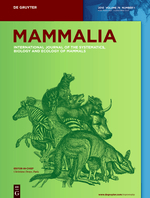
MAMMALIA
Advancing knowledge in mammalian science.MAMMALIA, published by Walter de Gruyter GmbH, is a renowned academic journal founded in 1936 that serves as a pivotal resource for researchers and professionals in the fields of Animal Science and Zoology as well as Ecology, Evolution, Behavior and Systematics. With an ISSN of 0025-1461 and an E-ISSN of 1864-1547, this journal has made significant contributions to mammalian research over the decades and continues to be pivotal in advancing knowledge within the scientific community. MAMMALIA is indexed in prominent databases, boasting a current Scopus ranking that places it within the upper echelons of the Q2 category in Animal Science and Zoology, and Q3 in Ecology, Evolution, Behavior and Systematics. Although it does not offer open access, the journal remains accessible through various academic institutions, ensuring that valuable research findings are disseminated widely. The journal’s commitment to quality and excellence in the study of mammals aligns with its high impact within the field, engaging a diverse readership that includes researchers, students, and professionals dedicated to furthering the understanding of mammalian biology. For more information, visit their office located at Genthiner Strasse 13, D-10785 Berlin, Germany.
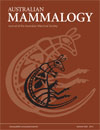
AUSTRALIAN MAMMALOGY
Pioneering Research in Zoology and Evolutionary BiologyAustralian Mammalogy, published by CSIRO PUBLISHING, is a pivotal journal in the fields of Animal Science and Zoology as well as Ecology, Evolution, Behavior and Systematics. With its ISSN 0310-0049 and E-ISSN 1836-7402, this esteemed journal has been instrumental in disseminating critical research findings since 2000, and continues to evolve up to 2024. Ranked in the Q2 quartile of both its categories for 2023, it showcases a diverse array of studies that contribute to understanding Australia’s unique mammalian fauna and its ecological dynamics. Researchers, professionals, and students will find valuable insights in its peer-reviewed articles, which are essential for advancing knowledge in these essential scientific disciplines. Located in Australia at UNIPARK, Locked Bag 10, Clayton, VIC, this journal remains committed to fostering scholarly communication within the global scientific community.
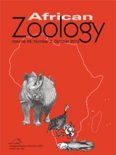
AFRICAN ZOOLOGY
Unveiling the Wonders of African WildlifeAFRICAN ZOOLOGY, published by Taylor & Francis Ltd, stands as a significant journal in the realm of Animal Science and Zoology, with a proud history dating back to 1996 and slated to continue until 2024. With an ISSN of 1562-7020 and E-ISSN 2224-073X, this journal provides a reputable platform for researchers and practitioners dedicated to the study of animal biology across the African continent. It has been recognized for its quality scholarship, evidenced by its Q3 categorization in the 2023 Scopus quartile rankings and an impressive rank of #182 out of 490 within its field. As an open-access journal, it facilitates the dissemination of vital research findings and promotes broader accessibility, catering to a diverse audience of professionals, scholars, and students alike. The journal aims to enhance our understanding of wildlife, conservation, and ecosystem dynamics in Africa, fostering collaborations that address critical ecological challenges. For researchers and enthusiasts keen on contributing to and staying informed about advancements in zoological science, AFRICAN ZOOLOGY is an essential resource that enriches the global discourse on biodiversity and conservation efforts.
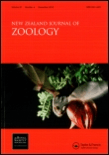
NEW ZEALAND JOURNAL OF ZOOLOGY
Elevating the Study of New Zealand's Unique Biodiversity.NEW ZEALAND JOURNAL OF ZOOLOGY, published by Taylor & Francis Ltd, offers a crucial platform for the dissemination of high-quality research in the field of zoology and animal science. With an ISSN of 0301-4223 and an E-ISSN of 1175-8821, this journal has been a valuable resource since its inception in 1974 and continues to contribute significantly to the academic community, with a converged years span extending to 2024. The journal holds a commendable Q3 ranking in the 2023 category of Animal Science and Zoology, and ranks #175 out of 490 in Scopus, placing it in the 64th percentile of its category. While it is not an Open Access journal, researchers can still access a wide range of studies that delve into various aspects of zoology. With its robust editorial standards and commitment to advancing knowledge in animal science, the NEW ZEALAND JOURNAL OF ZOOLOGY serves as an essential resource for researchers, professionals, and students interested in the complexities of wildlife and ecological studies.